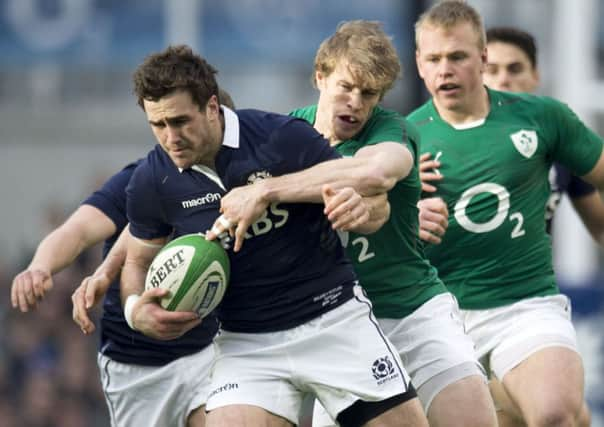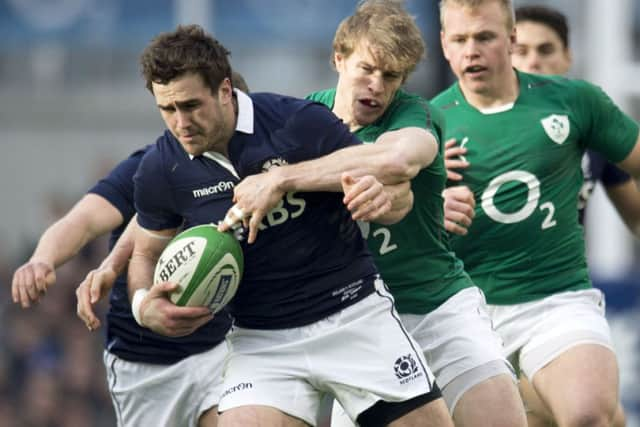Rory Lawson: Scotland outclassed, but optimistic


No-one will feel that more keenly than the players, but they know that, with just a six-day turnaround before England come to Murrayfield, they can lose no time in trying to rectify what went wrong in Dublin.
Last night will have been sleepless for many: the combination of adrenaline and disappointment will have made sure of that. After a game like yesterday, the wait for the meeting to review the game is painstaking. The players and coaches will watch clips of where things went wrong and want to be able to climb into the screen to do it all again. They will also look at the good things, opportunities created but not taken, of which there were several.
Advertisement
Hide AdAdvertisement
Hide AdIreland played very efficiently yesterday, clinically so at times. Their drift defence operated particularly well, and once an initial tackle had been made they were excellent at the breakdown.


Having said that, their attacking game was probably in third gear for much of the contest. They were not at their best, but, crucially, they took their chances when they arose and seemed to come away with points on most of their visits deep into Scotland territory.
For most of the game, both defences were on top. Small margins are crucial at this level and Scotland missed too many tackles. Johnny Sexton’s break that lit up the first half and Rob Kearney’s try were both instances of this. Other ‘work ons’ this week will be around the scrum and set-piece lineout. One scrum went against the head, our scrum creaked a little at other times, and there were problems in several lineouts on our own throw.
These are brief moments in an 80-minute game, but at international level those brief moments can have a lasting impact and the game can soon be out of your grasp. Test matches can be decided on very fine margins and several of those moments resulted in a significant momentum shift away from Scotland.
In the end, it was a comfortable win for Ireland, as they did not have to attempt anything spectacular or out of the ordinary to end up on top. But despite that, as we look forward to Saturday evening’s Calcutta Cup match, there are at least some reasons to be guardedly optimistic.
For one thing, I thought Scotland enjoyed the lion’s share of both territory and possession in the first half. For 37 minutes or so, the contest was finely poised – and then Andrew Trimble scored the try for Ireland, a real blow.
Starting the second half 11-3 down, Scotland knew that they would need to get the next score to get back into the game. That score came when Greig Laidlaw kicked his second penalty to make it 11-6. It was a one-score game, the match looked like opening up, but then before we knew it was taken away from us. When Ireland sniffed even a hint of vulnerability, they pounced on Scotland and went for the jugular.
Jamie Heaslip’s try was a bitter blow, putting Ireland firmly back in charge, and Kearney’s try sealing a memorable win on his 50th cap only emphasised the Irish superiority.
Advertisement
Hide AdAdvertisement
Hide AdAt times Scotland attacked with real purpose, retaining possession for long periods. Big ball carriers in the shape of Denton, Wilson, Dunbar and Lamont to name a few, ensured that the Irish had to defend like demons to protect their line. Ireland coach Joe Schmidt is best known for his attack but he has clearly built all of this on strong defensive foundations. They seem to have a mindset around the breakdown of physicality and ball disruption by two players. At times, Scotland got the quick ball they wanted but the Irish pick their opportunities to compete for ball so well, are technically superb and were capable of generating effective turnovers as a result. Referee Craig Joubert was really consistent in this area and had an excellent game. Don’t lose faith in the Scotland attack. It’s the hardest part of the game but the boys will be better for today’s findings.
The back three looked good on the counter-attack, Sean Maitland covered every blade of grass before he had to go off injured. Stuart Hogg was impressive, his twinkle toes ensuring Irish defenders never took an eye off him. Sean Lamont’s work rate is so impressive. You don’t often see the ground he covers off the ball but he constantly works off his wing to get his hands on the ball. Besides impressing individually, that trio as a whole worked well together. Duncan Weir was brave all day in defence and showed glimpses of his ability with ball in hand. Alex Dunbar also had an assured outing at 13. He looks like a real threat with the ball and notably putting in a few big defensive hits, and the backrow was prominent in both attack and defence. It was encouraging to see Denton, Wilson and Beattie (when he came off the bench) getting on the ball as they are really powerful and athletic specimens, capable of carrying the ball well and bashing defences. Today, though, Ireland tackled brilliantly and defused the threat.
Whatever is dictated by injury, I would expect Scott Johnson to make some changes voluntarily. A six-day turnaround is always demanding, but it will be especially so in this case for two reasons. First, England have an extra day to recover, having played in France on Saturday night. And second, the extremely tough nature of the Ireland match will have taken its toll.
The squad will probably only have a couple of sessions this week, as the first two days will be devoted to recovery and reflection. That’s the difficulty with a six-day turnaround: you have so little time to work on the things that went wrong before you’re thrown into the fray again. By the same token, it means it is only six days to wait until the next chance. You have no time to dwell on shortcomings. Instead, you simply have to assess them, amend them, then get out there and put those plans into practice.
Yesterday really hurt. But no matter how down we might have felt at the end, no matter how sore the players’ bodies and supporters’ heads may feel this morning, there is a chance just round the corner to put all that disappointment behind us. Murrayfield will be bouncing on Saturday. The players and public must believe. Scotland are only one big performance away from righting some wrongs.
SEE ALSO